新概念第二册Lesson 39 Am I all right课件(共53张PPT)
文档属性
| 名称 | 新概念第二册Lesson 39 Am I all right课件(共53张PPT) | 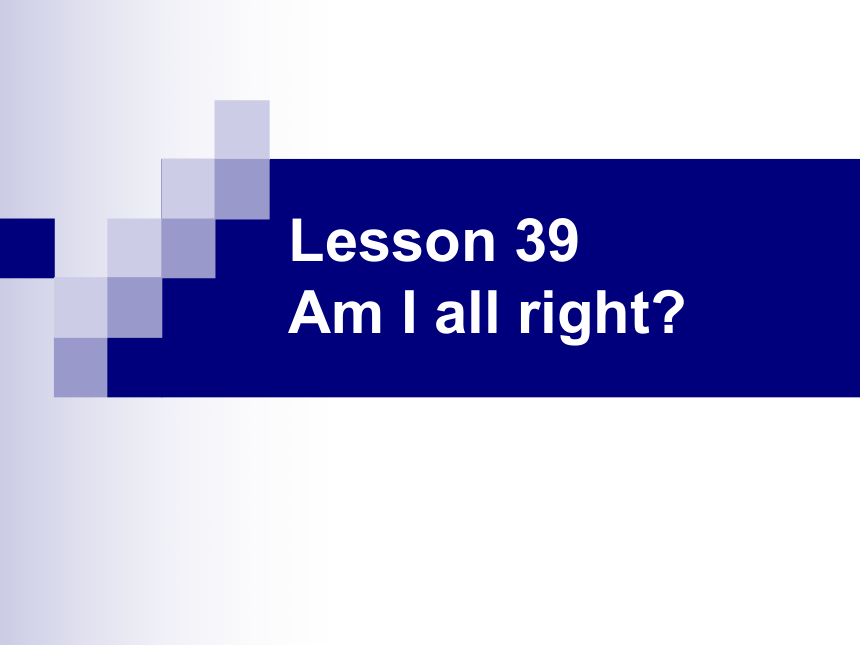 | |
| 格式 | ppt | ||
| 文件大小 | 1.9MB | ||
| 资源类型 | 教案 | ||
| 版本资源 | 新概念英语 | ||
| 科目 | 英语 | ||
| 更新时间 | 2025-01-02 14:56:11 | ||
图片预览



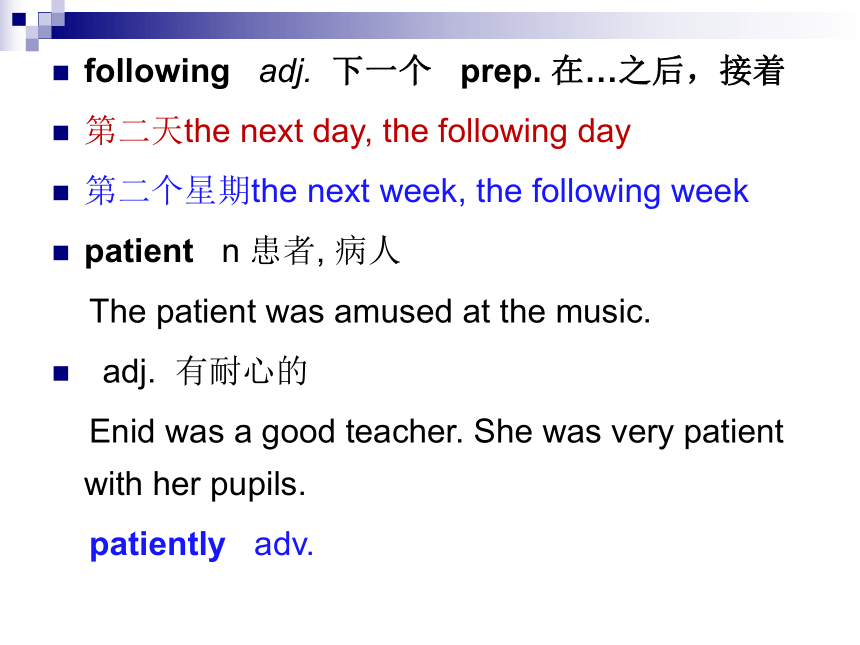
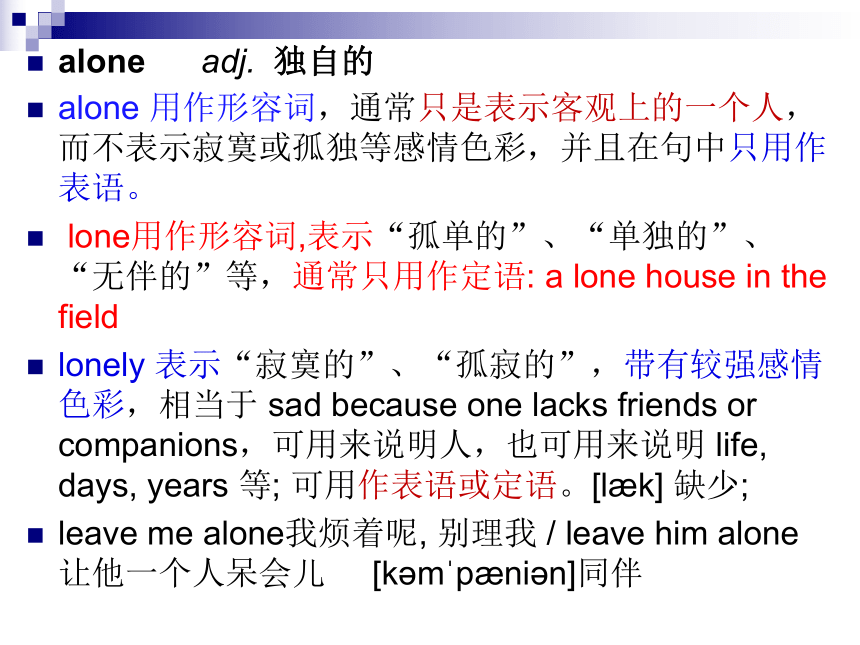

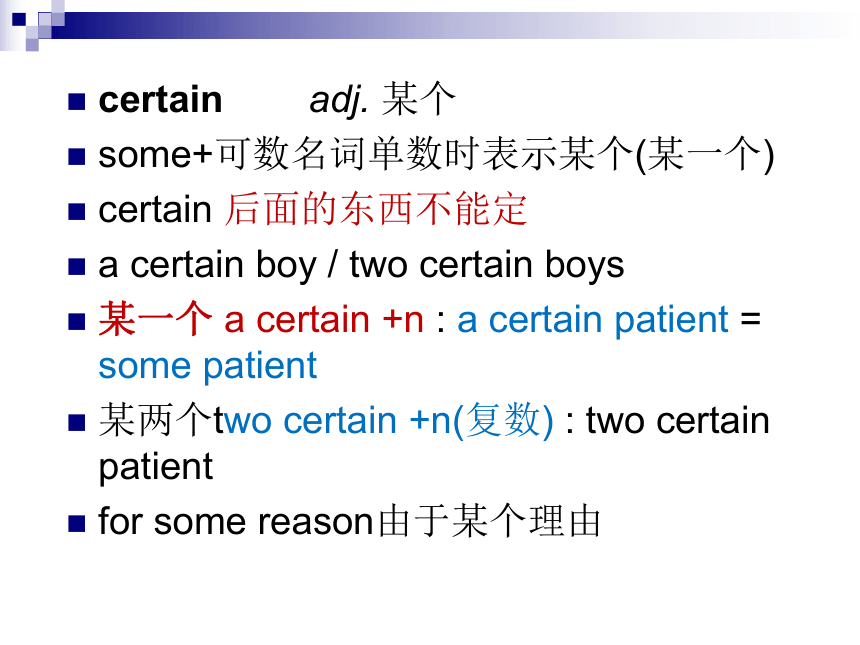
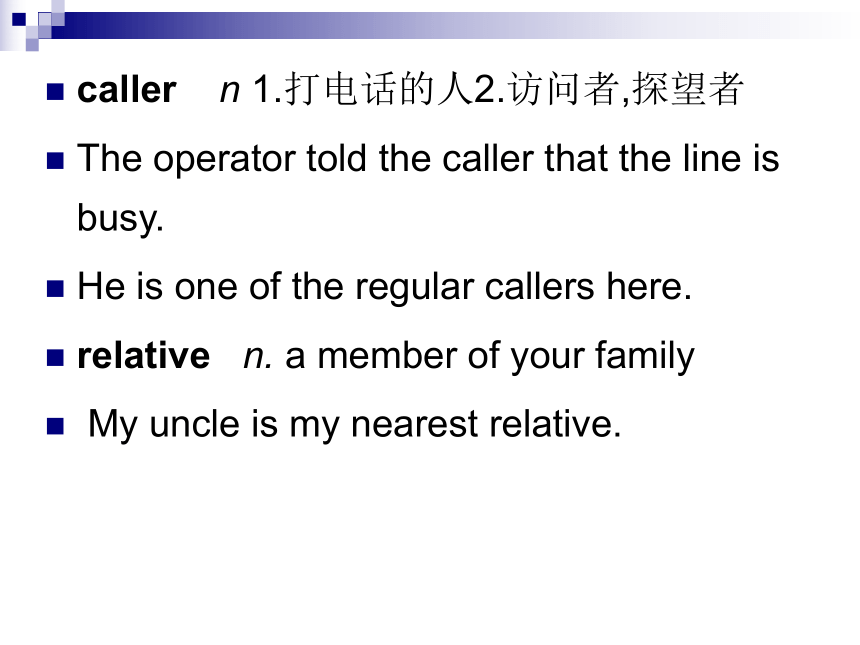



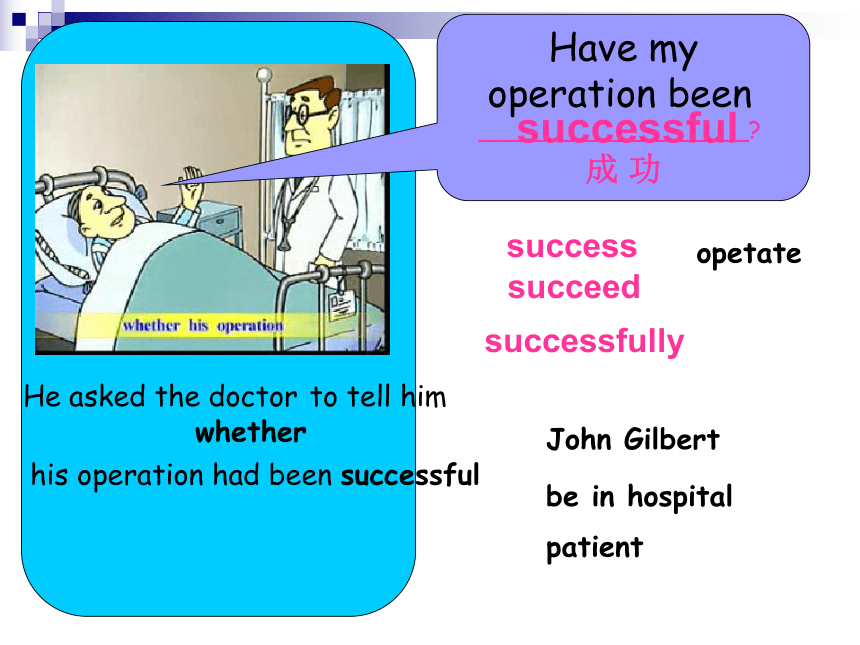
文档简介
(共53张PPT)
Lesson 39
Am I all right
Vocabulary
operation n. 1. 手术2.运转, 经营3. 行动, 活动
The doctor advised an immediate operation .
operate vi. (对…)动手术 v.运转; 操作;经营,
successful adj. 成功的 successful in 在…成功的
She is a successful businesswoman.
success n. 成功 [ k nf d ns] 信心
Confidence of success is almost success.
succeed v.
She's the type of person who succeeds anywhere.
following adj. 下一个 prep. 在…之后,接着
第二天the next day, the following day
第二个星期the next week, the following week
patient n 患者, 病人
The patient was amused at the music.
adj. 有耐心的
Enid was a good teacher. She was very patient with her pupils.
patiently adv.
alone adj. 独自的
alone 用作形容词,通常只是表示客观上的一个人,而不表示寂寞或孤独等感彩,并且在句中只用作表语。
lone用作形容词,表示“孤单的”、“单独的”、“无伴的”等,通常只用作定语: a lone house in the field
lonely 表示“寂寞的”、“孤寂的”,带有较强感彩,相当于 sad because one lacks friends or companions,可用来说明人,也可用来说明 life, days, years 等; 可用作表语或定语。[l k] 缺少;
leave me alone我烦着呢, 别理我 / leave him alone 让他一个人呆会儿 [k m p ni n]同伴
exchange n.交换, 调换, 兑换,
我想把这件衣服换一件小点尺寸的。
I'd like to exchange this dress for one in a smaller size.
vt.交流,
They exchanged experience at the meeting .
inquire v. 询问, 打听
inquire sth of sb 从某人那打听
inquire about sth 询问,查问;打听
inquire into 调查,探究
inquire for 求见;要找
certain adj. 某个
some+可数名词单数时表示某个(某一个)
certain 后面的东西不能定
a certain boy / two certain boys
某一个 a certain +n : a certain patient = some patient
某两个two certain +n(复数) : two certain patient
for some reason由于某个理由
caller n 1.打电话的人2.访问者,探望者
The operator told the caller that the line is busy.
He is one of the regular callers here.
relative n. a member of your family
My uncle is my nearest relative.
While John Gilbert was in hospital, he asked his doctor to tell him whether his operation had been successful, but the doctor refused to do so.
当约翰.吉尔伯特住院的时候,他问医生他的手术是否成功,但医生拒绝告诉他。
The following day, the patient asked for a bedside telephone.
第二天,这位病人要了一部床头电话。
When he was alone, he telephoned the hospital exchange and asked for Doctor Millington.
当房里只剩他一个人时,他接通了医院的交 换台,要求与米灵顿医生讲话。
When the doctor answered the phone, Mr. Gilbert said he was inquiring about a certain patient, a Mr. John Gilbert.
当这位医生接过电话时,吉尔伯特先生说他想询问一个病人的情况,是一位名叫约翰.吉尔伯特的先生。
He asked if Mr. Gilbert's operation had been successful and the doctor told him that it had been.
他问吉尔伯特先生的手术中 否成功,医生告诉他手术很成功。
He then asked when Mr. Gilbert would be allowed to go home and the doctor told him that he would have to stay in hospital for another two weeks.
然后他又问吉尔伯特先生什么时候可以回家,医生说他在医院还必须再住上两个星期。
Then Dr. Millington asked the caller if he was a relative of the patient. 'No,' the patient answered, 'I am Mr. John Gilbert.'
之后,米灵顿医生问打电话的人是否是病人 的亲属。“不是,”病人回答说,“我就是约翰.吉尔伯特先生。”
Have my operation been __________________
successful
成 功
He asked the doctor
to tell him
success
successfully
succeed
whether
his operation had been successful
be in hospital
opetate
patient
John Gilbert
The doctor refuse to do so.
I am sorry. I can’t tell you about that.
1. refuse to do sth.
2. refuse 反义词
accept
He asked for a bedside telephone.
a bedside telephone
ask for
The following day
be alone
lonely
独自的
孤独的;偏僻的
a lonely island
He has no friends, so he feel lonely.
telephone
call sb
call sb up
ask sb to do sth.
May I speak to doctor Millington
ask for
The hospital exchange
ask sb to not do sth.
I’m inquiring about a certain patient, a Mr. John.
inquire
询问;打听
What did he say
he
_______inquiring about a certain patient.
He said
was
‘Has Mr Gilbet’s operation been successful ’
What did he ask
He asked
_________Mr. Gilbet’s operation ______successful.
if/whether
had been
What did the doctor tell him?
‘Yes, It has been succeessful’
it had been successful.
He told him___________________
When will he allowed to go home
What did he ask
He asked_____
when
he _____ be allowed to
go home
would
He will have to stay in hospital for another two weeks.
The doctor told him ______he _____________ stay in hospital for another two days.
What did the doctor tell him
Are you a relative of the patient
What did the Dr. Millington ask
He asked ___ he ____ a relative of the patient.
that
would have to
was
if
No. I am Mr. John Gilbert.
What did the patient say at last
Grammar
直接引语 and 间接引语
在日常交流中,有时我们需要引述别人的话。直接引用别人的原话(放在引号内)就是直接引语,用自己的话转述别人的话叫间接引语。
二、直接引语转换成间接引语时,间接引语多为带宾语从句的主从复合句,转移过程应注意下列变化:
1)动词
间接引语主句动词主要有say, ask , tell, wonder 等。
He said to mum, “I can do house work for you.”
—He told mum that he could do housework for her.
She said to me, “Do you like milk ”—She asked me if I liked milk.
2) 句式/连词
陈述句:say +that+从句
tell+ sb. +that+从句
She said to me" I will came back an hour ago."
She told me (she said to me) that she had come back an hour before.
一般疑问句:ask/wonder + whether/ if+从句
She said ,"Are you going interested in English.
He ask (me) if /whether I was interested in English.
选择疑问句: ask/wonder + whether…+or…/or not
I asked him, “will you stay at home or go to a film tonight "
I ask him whether he would stay at home or go to a film that night.
反意疑问句:ask/wonder + whether/if +从句
"You've already got well, haven't you " she asked.
She asked whether /if he (I ) had already got well.
特殊疑问句: ask+ sb.+特殊疑问词+从句
He ask me ,“What‘s your name ”(疑问语序)
He asked me what my name was.(陈述语序)
如果在直接引语的特殊疑问句中,疑问词做主语或主语的修饰语,则语序不需要变化.
“Who can answer my question ” the teacher said to us.
The teacher asked us who could answer the question.
“Whose picture is the most beautiful in your class " asked the boy's father.
The boy's father asked him whose picture was the most beautiful in his class.
祈使句:ask/tell/advice/+ sb.+ (not) to do sth
suggest that+从句
He said to me “shut the window, please”(肯定句)
He ask me to shut the window.
He said,“ Don‘t make so much noise”(否定句)
He told us not to make so much noise.
“Let‘s go to the cinema.“ Tom said.(表建议)
Tom suggested that they should go to the cinema.
感叹句: What或that引导
She said,“ What a lovely day it is!"
She said what a lovely day it was.
She said that it was a lovely day.
He said,“ How interesting the story is!"
She said how interesting the story was.
He said that the story was interesting.
直接引语为一般疑问句,间接引语用连词whether或if引导,原主句中谓语动词said要改为asked(me/him/us等),语序是陈述句的语序。
He said, “Do you have any difficulty with this new word ”
——>He asked(me)whether/if I had any difficulty with that new word.
间接引语位于句首时或者是间接引语提前时用whether不用if。 Thank you, but whether I’ll be free I’m not sure at the moment .
whether和if都可以引导宾语从句,“是否”
在口语或间接引语中两者可以互换使用。 I wonder if / whether I can get some advice from you.
在有些情况下,whether和if的用法有一定区别。 1. whether引导的从句常可以与连词or或or not直接连用,而if一般不能。如:
Let me know whether you can come or not. 2. 当宾语从句提到句首时,只能用whether引导 而不能用if。如: Whether it is true or not, I can’t tell.
3. whether可以引导带to的不定式,if则不能。如:
我不知道我是接受还是拒绝。
I don’t know whether to accept or refuse.
4. whether及其引导的成分可放于介词之后,作介词的宾语,但if不能。如:
我担心我是否伤害到她的感情。
I worry about whether I hurt her feelings.
直接引语转换成间接引语“闯五关”
第一关:人称代词与指示代词
直接引语变间接引语时,要注意人称代词和指示代词的变化。要根据说话的对象进行人称的变化,并使句子的意思前后一致。如:
“You should be careful next time,”my father said to me.
My father told me that I should be careful next time.
Tom said to me, “ I can help you with your English.”
Tom told me that he could help me with my English.
He said, “This book isn’t mine.”
He said that book wasn’t his.
人称
人称的变化——“一主、二宾、三不变”。 意为在改为间接引语时,直接引语里的第一人称照主句的主语变化。第二人称看主语的宾语而变化,第三人称无需变化。
Tom said to Kate , "Are you going there with me "
Tom ask Kate if she was going with him.
第一人称me随主语Tom变化为him,,第二人称you随Kate变化为she。
Kate said to Tom , "Are you going there with me "
Kate ask Tom if he was going with her.
第一人称me随主语Kate变化为her,第二人称you随宾语Tom变成he。
I said to Tom , "Are you going there with me "
i ask Tom if he was going with me.
第一人称me随主语I 变化,第二人称you随Tom变化为he.
指示代词、时间状语、地点状语、方向性动词的变化
第二关:引导词 1. 如果直接引语是陈述句,变成间接引语时,要用连词that来引导。如:
She said, “I’m very glad to have such a chance.”
She said that she was very glad to have such a chance. 2. 如果直接引语是一般疑问句,变成间接引语时,要用连词if或whether引导。如:
He asked me, “Do you like the film ”
He asked me if/whether I liked the film.
3. 如果直接引语是特殊疑问句,变成间接引语时,要用相应的疑问词引导。如:
My sister asked me, “What are you doing ”
My sister asked me what I was doing.
第三关:时间状语和地点状语
直接引语变间接引语时,时间状语和地点状语等要做相应的变化。如把now改为then, today改为that day, yesterday改为the day before, ago改为before, tomorrow改为the next day, here改为there等。
He said, “I’ll go there today.”
He said that he would go there that day.
注意:
如果当地转述,here不必改为there,动词come 不用改成go,如果当天转述,yesterday,tomorrow也不用改变。
Kate said," I will come here tomorrow to help these children with their English."
Kate said that she would go there the next day to help those student with their English.
Kate said that she will come here tomorrow to help these children with their English.(在当天当地转述)
第四关:时态的变化
直接引语变间接引语时,如果主句为现在(或将来)时态,间接引语的时态不变;如果主句为过去时态,间接引语中的谓语动词也要相应地用过去时态。如:
He says, “I am going to Beijing tomorrow.”
He says that he is going to Beijing tomorrow.
2. She said to me, “Li Ping will come tomorrow.”
She told me that Li Ping would come the next day.
温馨提示:如果转述的内容是客观真理时,自然现象或是谚语、格言时态不变。如:
He said, “Water boils at 100℃.”
He said that water boils at 100℃.
主句(直接引语)是一般现在时,间接引语时态不变;
主句是一般过去时,间接引语时态要改为相应的过去时。
直接引语 间接引语
一般现在时 一般过去时
一般过去时 过去完成时
现在进行时 过去进行时
现在完成时 过去完成时
过去完成时 过去完成时
过去进行时 过去进行时
一般将来时 过去将来时
第五关:句子结构的变化
直接引语变间接引语时,间接引语要用陈述句的语序。引导词要放在间接引语的最前面,接下来按“主谓宾”顺序排列。即:直接引语转换成间接引语时用陈述语序
He asked Mike, “Where did you go ”
He asked Mike where he had gone.
直接引语变
间接引语
1、人称的转变
1)直接引语中的第一人称一般与说话人一致。
如: He said,“I am very sorry.”
——>He said that he was very sorry.
2)直接引语中的第二人称转换为与听话人一致。
如: “You should be more careful next time,” my father told me.
——> My father told me that I should be more careful the next time.
3)直接引语中的第二人称,如果原话是针对第三人称说的,转换成第三人称。
如: She said to her son, “I'll check your homework tonight.”
——> She said to her son that she would check his homework that night.
4)人称的转换包括人称代词、物主代词和名词性物主代词等,
如: He asked me, “Will you go to the station with me to meet a friend of mine this afternoon ”
——> He asked me whether I would go to the station with him to meet a friend of his that afternoon.
总之,人称的转换不是固定的,具体情况,具体对待,要符合逻辑。
2、时态的转换 直接引语改为间接引语时,主句中的谓语动词如果是过去时,从句(即间接引语部分)的谓语动词在时态方面要作相应的变化,变成过去时范畴的各种时态(实际也是宾语从句的时态要求),变化如下:
直接引语 间接引语
一般现在时 一般过去时
一般过去时 过去完成时
现在进行时 过去进行时
现在完成时 过去完成时
过去完成时 过去完成时
过去进行时 过去进行时
一般将来时 过去将来时
3、直接引语变成间接引语时,从句时态无须改变的情况
1)当主句的谓语动词是一般现在时的时候,
如: He always says, “I am tired out.”
——>He always says that he is tired out.
2)当主句的谓语动词是将来时的时候,
如: He will say, “I’ll try my best to help you.”
——>He will say that he will try his best to help me.
3)当直接引语部分带有具体的过去时间状语时
如: He said, “I went to college in 1994.”
——>He told us that he went to college in 1994.
4)当直接引语中有以when, while引导的从句,表示过去的时间时,
如: He said,“When I was a child, I usually played football after school.”
——> He said that when he was a child, he usually played football after school.
5)当直接引语是客观真理或自然现象时,如: Our teacher said to us, “Light travels faster than sound.”
——> Our teacher told us that light travels faster than sound.
6)当引语是谚语、格言时,
如: He said,“Practice makes perfect.”
——>He said that practice makes perfect.
7)当直接引语中有情态动词should, would, could, had better, would rather, might, must, ought to, used to, need时 ,如:She asked, “Must I take the medicine ”
——> She asked if she had to take the medicine.
〔注〕:此处用had to代替must更好 8)此外转述中的变化要因实际情况而定,不能机械照搬,如果当地转述,here不必改为there, 动词come不必改为go,如果当天转述yesterday, tomorrow, this afternoon等均不必改变。
4、时间状语、地点状语及某些对比性的指示代词和动词变化
1)时间状语:
直接引语 (间接引语)
now (then);
today (that day);
tomorrow (the next / following day )
next week (the next / following week)
yesterday (the day before)
two days ago(two days before )
this week/month/year (that week/month/ year)
2)指示代词:these 变成those
two days ago(two days before )
this week/month/year (that week/month/ year)
2)指示代词:these 变成those
3)地点状语:here变成there
She said, “I won't come here any more.”
——> She said that she wouldn’t go there any more.
4)动词:come变成go,bring变成take
5、直接引语变间接引语,句子结构的变化
1)陈述句。用连词that引导,that在口语中常省略。主句的谓语动词可直用接引语中的said, 也可用told来代替,注意,可以说said that, said to sb. that, told sb. that,不可直接说told that,
如: He said, “I have been to the Great Wall.”
——>He said to us that he had been to the Great Wall.
He said, “I'll give you an examination next Monday.”
——> He told us that he would give us an examination the next Monday.(不可说told that)
2)直接引语为一般疑问句,(也称是否疑问句,)间接引语用连词whether或if引导,原主句中谓语动词said要改为asked(me/him/us等),语序是陈述句的语序。
如: He said, “Do you have any difficulty with pronunciation ”
——>He asked(me)whether/if I had any difficulty with my pronunciation.
3) 直接引语为选择疑问句,间接引语用whether…or…表达,而不用if…or…,也不用either…or….
如: He asked, “Do you speak English or French ”
——> He asked me whether I spoke English or French.
4)直接引语为特殊疑问句,改成间接引语时,原来的疑问词作为间接引语的连词,主句的谓语动词用ask(sb.)来表达,语序改为陈述句语序。
如: He asked,“What's your name ”
——> He asked(me)what my name was.
5)直接引语为祈使句时,改为间接引语,用带to的不定式表达,谓语动词常是ask, advise, tell, warn, order, request等。如ask sb. to do,(由肯定祈使句变成)ask sb. not to do(由否定祈使句转变),并且在不定式短语中的时间状语、地点
状语、人称及时态都作相应的变化。
如: He said,“Be seated, please.”
——> He asked us to be seated.
6)有些含有“建议”——>、“劝告”——>的祈使句,可用suggest, insist, offer等动词转述,
如: He said, “Let's have a rest.”
——> He suggested our having a rest
7)当直接引语形式上是疑问句,有表示请求,建议意义时,可用ask sb. to do sth. /suggest doing/advise sb. to do sth. 等形式转述。
如: “Would you mind opening the door ” he asked.
——>He asked me to open the door.
8)直接引语是感叹句时,变间接引语可用what或how引导,也可用that引导,
如: She said, “What a lovely day it is!”
——> She said what a lovely day it was.
或She said that it was a lovely day .
Lesson 39
Am I all right
Vocabulary
operation n. 1. 手术2.运转, 经营3. 行动, 活动
The doctor advised an immediate operation .
operate vi. (对…)动手术 v.运转; 操作;经营,
successful adj. 成功的 successful in 在…成功的
She is a successful businesswoman.
success n. 成功 [ k nf d ns] 信心
Confidence of success is almost success.
succeed v.
She's the type of person who succeeds anywhere.
following adj. 下一个 prep. 在…之后,接着
第二天the next day, the following day
第二个星期the next week, the following week
patient n 患者, 病人
The patient was amused at the music.
adj. 有耐心的
Enid was a good teacher. She was very patient with her pupils.
patiently adv.
alone adj. 独自的
alone 用作形容词,通常只是表示客观上的一个人,而不表示寂寞或孤独等感彩,并且在句中只用作表语。
lone用作形容词,表示“孤单的”、“单独的”、“无伴的”等,通常只用作定语: a lone house in the field
lonely 表示“寂寞的”、“孤寂的”,带有较强感彩,相当于 sad because one lacks friends or companions,可用来说明人,也可用来说明 life, days, years 等; 可用作表语或定语。[l k] 缺少;
leave me alone我烦着呢, 别理我 / leave him alone 让他一个人呆会儿 [k m p ni n]同伴
exchange n.交换, 调换, 兑换,
我想把这件衣服换一件小点尺寸的。
I'd like to exchange this dress for one in a smaller size.
vt.交流,
They exchanged experience at the meeting .
inquire v. 询问, 打听
inquire sth of sb 从某人那打听
inquire about sth 询问,查问;打听
inquire into 调查,探究
inquire for 求见;要找
certain adj. 某个
some+可数名词单数时表示某个(某一个)
certain 后面的东西不能定
a certain boy / two certain boys
某一个 a certain +n : a certain patient = some patient
某两个two certain +n(复数) : two certain patient
for some reason由于某个理由
caller n 1.打电话的人2.访问者,探望者
The operator told the caller that the line is busy.
He is one of the regular callers here.
relative n. a member of your family
My uncle is my nearest relative.
While John Gilbert was in hospital, he asked his doctor to tell him whether his operation had been successful, but the doctor refused to do so.
当约翰.吉尔伯特住院的时候,他问医生他的手术是否成功,但医生拒绝告诉他。
The following day, the patient asked for a bedside telephone.
第二天,这位病人要了一部床头电话。
When he was alone, he telephoned the hospital exchange and asked for Doctor Millington.
当房里只剩他一个人时,他接通了医院的交 换台,要求与米灵顿医生讲话。
When the doctor answered the phone, Mr. Gilbert said he was inquiring about a certain patient, a Mr. John Gilbert.
当这位医生接过电话时,吉尔伯特先生说他想询问一个病人的情况,是一位名叫约翰.吉尔伯特的先生。
He asked if Mr. Gilbert's operation had been successful and the doctor told him that it had been.
他问吉尔伯特先生的手术中 否成功,医生告诉他手术很成功。
He then asked when Mr. Gilbert would be allowed to go home and the doctor told him that he would have to stay in hospital for another two weeks.
然后他又问吉尔伯特先生什么时候可以回家,医生说他在医院还必须再住上两个星期。
Then Dr. Millington asked the caller if he was a relative of the patient. 'No,' the patient answered, 'I am Mr. John Gilbert.'
之后,米灵顿医生问打电话的人是否是病人 的亲属。“不是,”病人回答说,“我就是约翰.吉尔伯特先生。”
Have my operation been __________________
successful
成 功
He asked the doctor
to tell him
success
successfully
succeed
whether
his operation had been successful
be in hospital
opetate
patient
John Gilbert
The doctor refuse to do so.
I am sorry. I can’t tell you about that.
1. refuse to do sth.
2. refuse 反义词
accept
He asked for a bedside telephone.
a bedside telephone
ask for
The following day
be alone
lonely
独自的
孤独的;偏僻的
a lonely island
He has no friends, so he feel lonely.
telephone
call sb
call sb up
ask sb to do sth.
May I speak to doctor Millington
ask for
The hospital exchange
ask sb to not do sth.
I’m inquiring about a certain patient, a Mr. John.
inquire
询问;打听
What did he say
he
_______inquiring about a certain patient.
He said
was
‘Has Mr Gilbet’s operation been successful ’
What did he ask
He asked
_________Mr. Gilbet’s operation ______successful.
if/whether
had been
What did the doctor tell him?
‘Yes, It has been succeessful’
it had been successful.
He told him___________________
When will he allowed to go home
What did he ask
He asked_____
when
he _____ be allowed to
go home
would
He will have to stay in hospital for another two weeks.
The doctor told him ______he _____________ stay in hospital for another two days.
What did the doctor tell him
Are you a relative of the patient
What did the Dr. Millington ask
He asked ___ he ____ a relative of the patient.
that
would have to
was
if
No. I am Mr. John Gilbert.
What did the patient say at last
Grammar
直接引语 and 间接引语
在日常交流中,有时我们需要引述别人的话。直接引用别人的原话(放在引号内)就是直接引语,用自己的话转述别人的话叫间接引语。
二、直接引语转换成间接引语时,间接引语多为带宾语从句的主从复合句,转移过程应注意下列变化:
1)动词
间接引语主句动词主要有say, ask , tell, wonder 等。
He said to mum, “I can do house work for you.”
—He told mum that he could do housework for her.
She said to me, “Do you like milk ”—She asked me if I liked milk.
2) 句式/连词
陈述句:say +that+从句
tell+ sb. +that+从句
She said to me" I will came back an hour ago."
She told me (she said to me) that she had come back an hour before.
一般疑问句:ask/wonder + whether/ if+从句
She said ,"Are you going interested in English.
He ask (me) if /whether I was interested in English.
选择疑问句: ask/wonder + whether…+or…/or not
I asked him, “will you stay at home or go to a film tonight "
I ask him whether he would stay at home or go to a film that night.
反意疑问句:ask/wonder + whether/if +从句
"You've already got well, haven't you " she asked.
She asked whether /if he (I ) had already got well.
特殊疑问句: ask+ sb.+特殊疑问词+从句
He ask me ,“What‘s your name ”(疑问语序)
He asked me what my name was.(陈述语序)
如果在直接引语的特殊疑问句中,疑问词做主语或主语的修饰语,则语序不需要变化.
“Who can answer my question ” the teacher said to us.
The teacher asked us who could answer the question.
“Whose picture is the most beautiful in your class " asked the boy's father.
The boy's father asked him whose picture was the most beautiful in his class.
祈使句:ask/tell/advice/+ sb.+ (not) to do sth
suggest that+从句
He said to me “shut the window, please”(肯定句)
He ask me to shut the window.
He said,“ Don‘t make so much noise”(否定句)
He told us not to make so much noise.
“Let‘s go to the cinema.“ Tom said.(表建议)
Tom suggested that they should go to the cinema.
感叹句: What或that引导
She said,“ What a lovely day it is!"
She said what a lovely day it was.
She said that it was a lovely day.
He said,“ How interesting the story is!"
She said how interesting the story was.
He said that the story was interesting.
直接引语为一般疑问句,间接引语用连词whether或if引导,原主句中谓语动词said要改为asked(me/him/us等),语序是陈述句的语序。
He said, “Do you have any difficulty with this new word ”
——>He asked(me)whether/if I had any difficulty with that new word.
间接引语位于句首时或者是间接引语提前时用whether不用if。 Thank you, but whether I’ll be free I’m not sure at the moment .
whether和if都可以引导宾语从句,“是否”
在口语或间接引语中两者可以互换使用。 I wonder if / whether I can get some advice from you.
在有些情况下,whether和if的用法有一定区别。 1. whether引导的从句常可以与连词or或or not直接连用,而if一般不能。如:
Let me know whether you can come or not. 2. 当宾语从句提到句首时,只能用whether引导 而不能用if。如: Whether it is true or not, I can’t tell.
3. whether可以引导带to的不定式,if则不能。如:
我不知道我是接受还是拒绝。
I don’t know whether to accept or refuse.
4. whether及其引导的成分可放于介词之后,作介词的宾语,但if不能。如:
我担心我是否伤害到她的感情。
I worry about whether I hurt her feelings.
直接引语转换成间接引语“闯五关”
第一关:人称代词与指示代词
直接引语变间接引语时,要注意人称代词和指示代词的变化。要根据说话的对象进行人称的变化,并使句子的意思前后一致。如:
“You should be careful next time,”my father said to me.
My father told me that I should be careful next time.
Tom said to me, “ I can help you with your English.”
Tom told me that he could help me with my English.
He said, “This book isn’t mine.”
He said that book wasn’t his.
人称
人称的变化——“一主、二宾、三不变”。 意为在改为间接引语时,直接引语里的第一人称照主句的主语变化。第二人称看主语的宾语而变化,第三人称无需变化。
Tom said to Kate , "Are you going there with me "
Tom ask Kate if she was going with him.
第一人称me随主语Tom变化为him,,第二人称you随Kate变化为she。
Kate said to Tom , "Are you going there with me "
Kate ask Tom if he was going with her.
第一人称me随主语Kate变化为her,第二人称you随宾语Tom变成he。
I said to Tom , "Are you going there with me "
i ask Tom if he was going with me.
第一人称me随主语I 变化,第二人称you随Tom变化为he.
指示代词、时间状语、地点状语、方向性动词的变化
第二关:引导词 1. 如果直接引语是陈述句,变成间接引语时,要用连词that来引导。如:
She said, “I’m very glad to have such a chance.”
She said that she was very glad to have such a chance. 2. 如果直接引语是一般疑问句,变成间接引语时,要用连词if或whether引导。如:
He asked me, “Do you like the film ”
He asked me if/whether I liked the film.
3. 如果直接引语是特殊疑问句,变成间接引语时,要用相应的疑问词引导。如:
My sister asked me, “What are you doing ”
My sister asked me what I was doing.
第三关:时间状语和地点状语
直接引语变间接引语时,时间状语和地点状语等要做相应的变化。如把now改为then, today改为that day, yesterday改为the day before, ago改为before, tomorrow改为the next day, here改为there等。
He said, “I’ll go there today.”
He said that he would go there that day.
注意:
如果当地转述,here不必改为there,动词come 不用改成go,如果当天转述,yesterday,tomorrow也不用改变。
Kate said," I will come here tomorrow to help these children with their English."
Kate said that she would go there the next day to help those student with their English.
Kate said that she will come here tomorrow to help these children with their English.(在当天当地转述)
第四关:时态的变化
直接引语变间接引语时,如果主句为现在(或将来)时态,间接引语的时态不变;如果主句为过去时态,间接引语中的谓语动词也要相应地用过去时态。如:
He says, “I am going to Beijing tomorrow.”
He says that he is going to Beijing tomorrow.
2. She said to me, “Li Ping will come tomorrow.”
She told me that Li Ping would come the next day.
温馨提示:如果转述的内容是客观真理时,自然现象或是谚语、格言时态不变。如:
He said, “Water boils at 100℃.”
He said that water boils at 100℃.
主句(直接引语)是一般现在时,间接引语时态不变;
主句是一般过去时,间接引语时态要改为相应的过去时。
直接引语 间接引语
一般现在时 一般过去时
一般过去时 过去完成时
现在进行时 过去进行时
现在完成时 过去完成时
过去完成时 过去完成时
过去进行时 过去进行时
一般将来时 过去将来时
第五关:句子结构的变化
直接引语变间接引语时,间接引语要用陈述句的语序。引导词要放在间接引语的最前面,接下来按“主谓宾”顺序排列。即:直接引语转换成间接引语时用陈述语序
He asked Mike, “Where did you go ”
He asked Mike where he had gone.
直接引语变
间接引语
1、人称的转变
1)直接引语中的第一人称一般与说话人一致。
如: He said,“I am very sorry.”
——>He said that he was very sorry.
2)直接引语中的第二人称转换为与听话人一致。
如: “You should be more careful next time,” my father told me.
——> My father told me that I should be more careful the next time.
3)直接引语中的第二人称,如果原话是针对第三人称说的,转换成第三人称。
如: She said to her son, “I'll check your homework tonight.”
——> She said to her son that she would check his homework that night.
4)人称的转换包括人称代词、物主代词和名词性物主代词等,
如: He asked me, “Will you go to the station with me to meet a friend of mine this afternoon ”
——> He asked me whether I would go to the station with him to meet a friend of his that afternoon.
总之,人称的转换不是固定的,具体情况,具体对待,要符合逻辑。
2、时态的转换 直接引语改为间接引语时,主句中的谓语动词如果是过去时,从句(即间接引语部分)的谓语动词在时态方面要作相应的变化,变成过去时范畴的各种时态(实际也是宾语从句的时态要求),变化如下:
直接引语 间接引语
一般现在时 一般过去时
一般过去时 过去完成时
现在进行时 过去进行时
现在完成时 过去完成时
过去完成时 过去完成时
过去进行时 过去进行时
一般将来时 过去将来时
3、直接引语变成间接引语时,从句时态无须改变的情况
1)当主句的谓语动词是一般现在时的时候,
如: He always says, “I am tired out.”
——>He always says that he is tired out.
2)当主句的谓语动词是将来时的时候,
如: He will say, “I’ll try my best to help you.”
——>He will say that he will try his best to help me.
3)当直接引语部分带有具体的过去时间状语时
如: He said, “I went to college in 1994.”
——>He told us that he went to college in 1994.
4)当直接引语中有以when, while引导的从句,表示过去的时间时,
如: He said,“When I was a child, I usually played football after school.”
——> He said that when he was a child, he usually played football after school.
5)当直接引语是客观真理或自然现象时,如: Our teacher said to us, “Light travels faster than sound.”
——> Our teacher told us that light travels faster than sound.
6)当引语是谚语、格言时,
如: He said,“Practice makes perfect.”
——>He said that practice makes perfect.
7)当直接引语中有情态动词should, would, could, had better, would rather, might, must, ought to, used to, need时 ,如:She asked, “Must I take the medicine ”
——> She asked if she had to take the medicine.
〔注〕:此处用had to代替must更好 8)此外转述中的变化要因实际情况而定,不能机械照搬,如果当地转述,here不必改为there, 动词come不必改为go,如果当天转述yesterday, tomorrow, this afternoon等均不必改变。
4、时间状语、地点状语及某些对比性的指示代词和动词变化
1)时间状语:
直接引语 (间接引语)
now (then);
today (that day);
tomorrow (the next / following day )
next week (the next / following week)
yesterday (the day before)
two days ago(two days before )
this week/month/year (that week/month/ year)
2)指示代词:these 变成those
two days ago(two days before )
this week/month/year (that week/month/ year)
2)指示代词:these 变成those
3)地点状语:here变成there
She said, “I won't come here any more.”
——> She said that she wouldn’t go there any more.
4)动词:come变成go,bring变成take
5、直接引语变间接引语,句子结构的变化
1)陈述句。用连词that引导,that在口语中常省略。主句的谓语动词可直用接引语中的said, 也可用told来代替,注意,可以说said that, said to sb. that, told sb. that,不可直接说told that,
如: He said, “I have been to the Great Wall.”
——>He said to us that he had been to the Great Wall.
He said, “I'll give you an examination next Monday.”
——> He told us that he would give us an examination the next Monday.(不可说told that)
2)直接引语为一般疑问句,(也称是否疑问句,)间接引语用连词whether或if引导,原主句中谓语动词said要改为asked(me/him/us等),语序是陈述句的语序。
如: He said, “Do you have any difficulty with pronunciation ”
——>He asked(me)whether/if I had any difficulty with my pronunciation.
3) 直接引语为选择疑问句,间接引语用whether…or…表达,而不用if…or…,也不用either…or….
如: He asked, “Do you speak English or French ”
——> He asked me whether I spoke English or French.
4)直接引语为特殊疑问句,改成间接引语时,原来的疑问词作为间接引语的连词,主句的谓语动词用ask(sb.)来表达,语序改为陈述句语序。
如: He asked,“What's your name ”
——> He asked(me)what my name was.
5)直接引语为祈使句时,改为间接引语,用带to的不定式表达,谓语动词常是ask, advise, tell, warn, order, request等。如ask sb. to do,(由肯定祈使句变成)ask sb. not to do(由否定祈使句转变),并且在不定式短语中的时间状语、地点
状语、人称及时态都作相应的变化。
如: He said,“Be seated, please.”
——> He asked us to be seated.
6)有些含有“建议”——>、“劝告”——>的祈使句,可用suggest, insist, offer等动词转述,
如: He said, “Let's have a rest.”
——> He suggested our having a rest
7)当直接引语形式上是疑问句,有表示请求,建议意义时,可用ask sb. to do sth. /suggest doing/advise sb. to do sth. 等形式转述。
如: “Would you mind opening the door ” he asked.
——>He asked me to open the door.
8)直接引语是感叹句时,变间接引语可用what或how引导,也可用that引导,
如: She said, “What a lovely day it is!”
——> She said what a lovely day it was.
或She said that it was a lovely day .
同课章节目录
